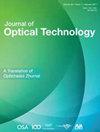Multiplication of a Gaussian beam by a multisector binary phase plate into scalar vortex beams for laser microprocessing
IF 0.6
4区 物理与天体物理
Q4 OPTICS
引用次数: 0
Abstract
Subject of study. A method of multiplying Gaussian laser beams into scalar vortex beams using multisector binary phase plates for increased speed and productivity of laser microprocessing is studied. The purpose of the work is to apply the technology of structuring transparent dielectrics by a laser-induced microplasma for fabricating multisector binary phase plates on fused silica. Methodology of the work. Multisector binary phase plates on fused silica structures with 4, 6, and 10 sectors with phase levels of 0 and π for operation at a wavelength of 1.06 µm were fabricated using an experimental setup for implementing the laser-induced microplasma technology. Additional annealing was conducted in a furnace to clean the surface and reduce the roughness of the multisector binary phase plates in the area of laser-induced microplasma action. The fabricated multisector binary phase plates were tested by registering generated intensity distributions in the plane of increased contrast using a photosensitive camera and by ablation of steel samples. We measured the initial laser beam energy and multisector binary phase plate output energy to evaluate the energy conversion efficiency. Main results. The obtained results indicate that the fabricated multisector binary phase plates multiply a Gaussian beam into a series of diffraction-limited spots surrounding the region with zero intensity and the same intensity (standard deviation not larger than 1%), the same spot diameters (standard deviation not larger than 5%), and high energy conversion efficiency (approximately 92%). Practical significance. Such multisector binary phase plates fabricated by a laser-induced microplasma have a real prospect for use in the field of laser microprocessing of materials.用多扇区二元相位板将高斯光束倍增成用于激光微加工的标量涡旋光束
研究主题。为了提高激光微加工的速度和生产率,研究了一种利用多扇区二元相板将高斯激光束倍增成标量涡旋光束的方法。本研究的目的是应用激光诱导微等离子体构建透明介质的技术,在熔融二氧化硅上制备多扇区二元相板。工作方法。采用激光诱导微等离子体技术,在1.06µm波长下,在4、6和10扇区的熔融硅结构上制备了相位为0和π的多扇区二元相片。在激光诱导微等离子体作用区域,对多扇形二元相板进行了额外的退火处理,以清洁其表面,降低其粗糙度。利用光敏相机记录在增强对比度平面上产生的强度分布,并对钢样品进行烧蚀,对制备的多扇区二元相板进行了测试。我们测量了激光束的初始能量和多扇区二相板的输出能量来评估能量转换效率。主要的结果。结果表明,所制备的多扇形二元相片将高斯光束叠加成一系列的衍射极限光斑,这些光斑的强度为零,且强度相同(标准差不大于1%),光斑直径相同(标准差不大于5%),能量转换效率高(约为92%)。现实意义。这种由激光诱导微等离子体制备的多扇区二元相板在材料激光微加工领域具有广阔的应用前景。
本文章由计算机程序翻译,如有差异,请以英文原文为准。
求助全文
约1分钟内获得全文
求助全文
来源期刊
CiteScore
0.90
自引率
25.00%
发文量
66
审稿时长
3-8 weeks
期刊介绍:
The journal publishes design details of a diversity of optical instruments, along with a strong section on computational optics useful to engineers, mathematicians, and physicists, as well as optical scientists. Issues of the English translation volume are published by OSA and appear at the same time as the Russian language edition, Opticheskii Zhurnal, which is produced by the Vavilov State Optical Institute

 求助内容:
求助内容: 应助结果提醒方式:
应助结果提醒方式:


